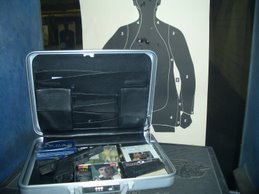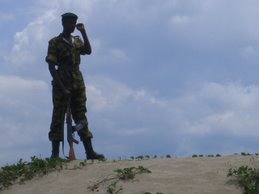Dear Fellow Patrons of the Arts,
Yes, I know I’ve been AWOL of late. Business. Really. Every now and again, a mercenary gets the capricious urge to explore, ahem, less risky lines of work. I was recently filling out a job application, and was asked to answer questions about my leadership potential and problem solving skills. Here’s what I wrote. What do you think? Do I stand any chance of getting the job?
1. Briefly describe the situation and the person/people you worked with.I was studying for my economics and statistics exams at Harvard when I received a phone call that changed my life. A stranger’s voice identified himself as a Senior Vice President at [insert corporation name]. He explained that they had just received a contract to raise an army for [insert small African country name], that I came highly recommended by “top men” at the [insert US government agency], and would I consider taking a year or two off from my graduate program to raise this army? Tired of studying Nash equilibria, I said “sure,” and two days later was in sweltering [insert capital city of said country] negotiating with vicious warlords and AK-47 wielding child-soldiers.
2. What specific challenges did you have in working with this person/these people?I arrived shortly after [insert brutal dictator’s name] flight to [insert nearby country], and [insert country of origin] was post-apocalyptic in its destruction. Many consider the civil war in [said country] to be one of the most egregious conflicts in Africa’s post-colonial history, and I was working with those responsible for many of its worst atrocities.
The task before me was daunting. Before creating a new military, I had to first demobilize [dictator’s] old army. A standing military had never been successfully demobilized in Africa without triggering a coup d’etat or worse. My first step was to identify and consult with all stakeholders, not only to glean their local knowledge but also foster ownership of the task. Second, I had to persuade the military, the most potent class of [said country’s] society, to lay down their weapons and become unemployed, insignificant farmers. Moreover, I had to do this without being murdered by child soldiers, who knew no other livelihood.
3. Describe the key things you did to overcome these challenges.I believed the key to success lie in treating the soldiers with dignity and respect, rather than as criminals and monsters. Many within the international community and [said country] society demurred at my approach, but it won me allies within the army itself. Old veterans, who had witnessed horrors beyond imagination, realized that life was more than the warm barrel of an AK-47. Together, we persuaded the entire [insert large number]-man military to lay down their weapons.
4. What was the outcome of this situation?It was the first time in modern African history that an entire standing army had been safely demobilized.





